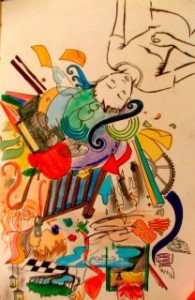Every year around the holidays, we post a roundup of books recommended by our staff writers to the LR Blog. The end of the current year is now fast approaching, and so in continuation of our tradition, here is a list of titles we enjoyed reading in 2012 and wanted to share with you:
* * *
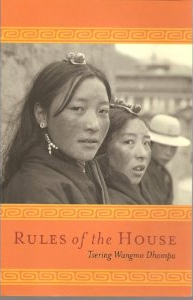
Rules of the House
by Tsering Wangmo Dhompa
Apogee Press, 2002
Recommended by Mia: “I recently started teaching full-time, so I haven’t had much time to read poetry… but I’m slowly working through Tsering Wangmo Dhompa’s Rules of the House. I’ve been savoring every poem because Dhompa has this way of leveling the reader with the slightest detail, all the while developing complex arcs that echo and extend throughout the book.”
* * *
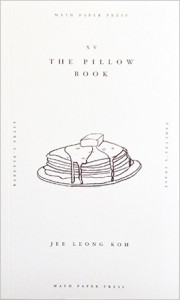
The Pillow Book
by Jee Leong Koh
Math Paper Press, 2012
Recommended by Wendy: “Inspired by the example of eleventh-century Japanese author and court lady Sei Shōnagon, Jee Leong Koh collects his miscellaneous jottings in his own pillow book. Written in the genre called zuihitsu, which compromises both prose and poetry, these observations, lists and anecdotes on life in Singapore and New York are, in turn, humorous, reflective, satirical, nostalgic and outrageous.”
* * *
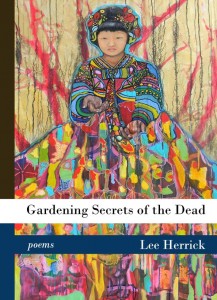
Gardening Secrets of the Dead
by Lee Herrick
Word Tech Editions, 2012
Recommended by Wendy: “[In Brian Turner’s words]: ‘Lee Herrick’s Gardening Secrets of the Dead is a lyric exploration of the fractured and fragmented landscape of the self, where the body is a song composed of many selves. Whitman revised, the poems ‘celebrate and assemble/ from around the world’ with a voice that is politically engaged and rooted in compassion.'”
* * *

Ascension
by giovanni singleton
Counterpath Press 2012
Winner of the 81st Annual California Book Award for Poetry
Recommended by Jai: “Comprised mostly of a daybook written during musician and spiritual leader Alice Coltrane’s 49-day transition between death and rebirth, giovanni singleton’s Ascension rings with unexpected cadences. As a soul ascends, what settles and rattles at our feet? From day to day, where are the stillnesses? These are the questions this book leads me to ask, as singleton takes us ‘way back to // where every sound / was a story and // every silence / epic.'”
* * *
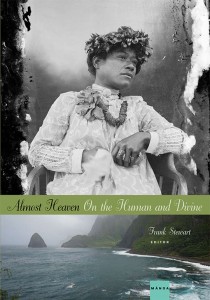
“Almost Heaven: On the Human and Divine“
[Volume 23.2 of Manoa]
Recommended by Henry: “This is volume 23.2 of Manoa, the volume that came out in 2011 just prior to ‘Sky Lanterns,’ with beautiful glass-plate negatives of Hawaii, and featuring writers on a variety of illusory paradises not limited to the Pacific. The essays especially are worth checking out!”
* * *
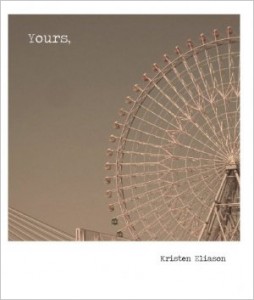
Yours,
by Kristen Eliason
Dancing Girl Press, 2012
Recommended by Iris: “I’ve been reading a lot of chaps this year (they’re perfect for short amounts of time, so I can read one on my lunch break), and this one is an absolute gift. Living overseas in the wake of a momentous tragedy, Eliason’s speaker grapples with her alienation and grief in a series of heartbreakingly spare missives—quiet snapshots in whose white spaces the rawness of loss seeps through. Eliason has a talent for lyric invocation, but the real power of this chap, for me, really lies in the spaces of absence that pit and fragment her text—the things she allows her speaker to leave unsaid.”
* * *
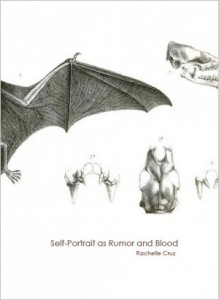
Self-Portrait as Rumor and Blood
by Rachelle Cruz
Dancing Girl Press, 2012
Recommended by Iris: “Another fabulous Dancing Girl title. Notable for the courageous viscerality of its voice, Cruz’s chap is tonally very different from Eliason’s, but also intensely powerful. Cruz’s speaker is a shape-shifter, slipping easily in and out of voices and narratives from across time and space in order to weave together a portrait that glistens as much with sinew as it does with the force of its story.”
* * *
Staff Publications: The LR Blog staff has also had a particularly busy year in terms of our own individual writing lives, and since this post is the one time a year that we get to feature the staff, we thought that this would be a perfect opportunity to share some of their recent and forthcoming publications with you. If you follow the blog regularly and are curious about our bloggers’ own poetic work, we hope you’ll consider adding a few of these titles to your future reading lists, as well!
- Jai Arun Ravine’s collection, แล้ว and then entwine, was published by Tinfish in 2011.
- Henry W. Leung’s Paradise Hunger won the 2012 Swan Scythe Press Poetry Chapbook Contest, and was published this fall.
- Mia A. Malhotra has a sheaf of poems in the Fall/Winter issue of AALR.
- Iris A. Law’s chapbook, Periodicity, is forthcoming from Finishing Line Press in February.
- Wendy Chin-Tanner’s first collection, Turn, is forthcoming from Sibling Rivalry Press in March 2014.
